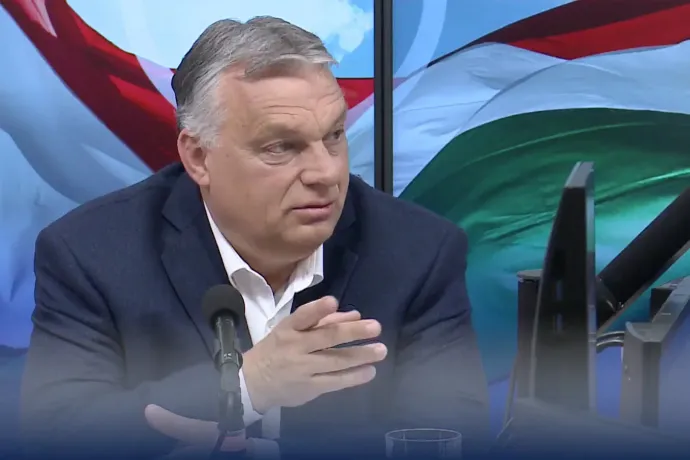
Most Friday mornings, Hungary’s prime minister gives an interview on one of the state-owned radio stations. Since the independent media has not had a chance to interview him for several years, these weekly radio interviews are the only opportunity to find out what the leader of the country thinks about current events, how he sees his opponents and any issues at hand. This is a summary of the most important points from this week's interview.
One of the most important political events of the week for Hungary was Wednesday's announcement by US Ambassador David Pressman that the United States has placed the Hungarian-based International Investment Bank (also known as the spy bank) and its three executives on the sanctions list. Two of them are Russian citizens, but one of them, the bank's vice-president, Imre Laszlóczki, is Hungarian. The next day the Orbán government decided that Hungary would leave the international financial organisation.
On leaving the IBB, and the American sanctions
According to the Hungarian Prime Minister, the International Investment Bank could have played a major role in the development of Central Europe. Since the outbreak of the war in Ukraine, however, the bank's options have been shrinking, but the US sanctions were its final ruin and made its operation impossible.
"If one looks at the facts, they will discover that these are not sanctions against Hungary," Viktor Orbán told Kossuth Rádió on Friday morning about the US bans. “There are 34 individuals on the sanctions list, and only one of them is Hungarian.”
Orbán claimed that the Hungarian government has never agreed with the use of sanctions, but does not dispute the right of the United States to do so. "We have taken note of this and we will abide by it," he added.
The United States is our friend
We have a good relationship with the Americans, Orbán said. We have only declared war on the US once in our history, and that was not a successful diplomatic manoeuvre. Since then, Hungary has always sought the closest possible friendly cooperation.
"The United States is our friend and an important ally."
It's a military, defence alliance, but the two countries are also linked by the fact that the US is a Christian country at its core. We also believe that freedom and a market economy are necessary for people to live in peace and prosperity, Orbán said. And as for the economic ties between the two countries, that's a success story, according to Orbán.
According to the Prime Minister, everything is in place for good and friendly relations, but we must also recognise that there are great divisions in the US, and great differences across party lines.
"When there is a Democrat in the White House, our relationship is harder, and when there's a Republican, it's easier."
- since the Republican viewpoint is closer to that of the Hungarian government, he said. Hungary has taken note of the Americans' choice and of who the Democratic government has sent as ambassador to Hungary, but the Prime Minister called the recent US billboard campaign in Hungary an unusual step. "Moreover, it's as if they missed a beat, because the poster talks about sending the 'Ruskis' home: we sent the Russians home already. I personally remember how it happened," Orbán said.
Orbán said there was a difference of opinion between the two countries on the war in Ukraine: Hungary wants peace, the US wants war. The prime minister understands the Americans, as they are in the safest place and far away from the Russian-Ukrainian war. It's easier for them to talk about nuclear war because they have a huge arsenal. But Orbán can't help but immediately thinks of Chernobyl when he thinks of nuclear war.
"We are right next door. Everything that happens there will become part of our lives the same day," he said.
The US has not given up its plan to involve everyone, including Hungary, in the war
- Orbán said, adding that the Hungarian government would not let this happen.
The situation in Europe is deteriorating
The situation in Europe was better two weeks ago and it keeps deteriorating, according to Orbán. The British are now talking about sending nuclear weapons to Ukraine, and the Prime Minister finds that spine chilling.
"The escalation of the war has already clearly shown that we are slowly reaching nuclear war. (...) If there is a world war, it will be a nuclear war."
This is what the course of events is indicating, according to the Hungarian Prime Minister.
If world leaders were sensible, the world could be in a much better state than it is now, Orbán said. In this respect, however, Macron's visit to China was a big step forward.
"The French president is the only European leader who is able to raise questions from a historical perspective," Orbán said. Our misfortune is that Macron is not thinking about a Christian future, but wants a liberal Europe.
The price caps will stay for now
Orbán also said that the rate at which inflation is falling is not yet enough to put an end to the price caps on certain food items. The Prime Minister hopes that the decrease in inflation will be felt more widely in April, not just on a few products. He called the drop reassuring, but not enough.
Viktor Orbán avoids critical questions at home. It’s been years since he gave an interview to independent media. However, for years, most Friday mornings he has been a regular guest on state-owned Kossuth Rádió, where he is interviewed by a leading editor of the public broadcasting service (operating from an annual budget of 320 millions of euros). Katalin Nagy has been almost exclusively the only person allowed to interview Orbán on the state-owned channel throughout his third and fourth term with a two-thirds majority in parliament. She has received the state decoration of the Cross of the Order of Merit of Hungary and doesn’t shy away from asking questions.